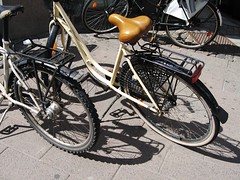
Copenhagen cycles
Originally uploaded by seadipper.
Although it was high tide when we went to swim this morning, we still had a long walk across the beach to get to the water. This is because today the tides are in their Neap phases, and there is only a 2 metre range between high and low water. In two weeks' time, we will be back to Spring tides and the range will be over six metres.
Everything is cyclic. Anyone who spends a lot of time out of doors or is involved with the sea will know this. The seasons, and the tides, for instance, are all cyclic. The sun rises and sets once every 24 hours. The tides come round roughly twice every 25 hours. Twice a month the tides cycle from Springs to Neaps. And this variation in tides changes with the seasons, and with other factors due to the inclination of the orbits of the earth and the moon. Then there is the 11 year sunspot cycle, which seems to have an effect on the weather. All these changes have astronomical causes.
There are some very long-term astronomical cycles of between 21,000 and 400,000 years, known as Milankovitch cycles, related to the way earth and moon wobble on their axes and move round each other, and round the sun, in orbits which are slightly eccentric. These appear to have an effect on the climate, though there the theory of how this might happen remains contentious. Beyond this, there may be even longer-term cycles as the solar system is in orbit round the centre of the galaxy, taking 225 million years to complete the circuit, with the possibility of encountering all sorts of objects on its way round.
There are also geological cycles. The present continents were formed from the break up of the supercontinent of Pangea, beginning about 200 million years ago. The evidence suggests that Pangea formed about 300 million years ago, and it appears that it came about from the collision of earlier contents, which themselves were the product of the break-up of an earlier supercontinent about 600 million years ago. And when the earth's land is clumped together in a supercontinent, the weather had a tendency to extremes of cold, heat and dryness, whereas when the land is separated into continents, the climate tends towards the wet and temperate.
On top of these cycles, there are biological cycles. Individual creatures and species seem to arise, flourish and decline with the passage of time.
It is also claimed that there are astrological cycles, based on the movents of the planets around the earth, but no-one has shown how the movement of distant and relatively lightweight planets could have a significant long-distance effect, or even that there is any real link can be detected. Possibly, planetary movements are a proxy for something else, but what?
There are economic cycles, too. The most familiar is the boom-bust cycle, of about 18 years. This manifests as a property price boom and bust, but in reality it is a land price irregularity. There have been two since the end of World War 2, with booms ending in crashes in 1974 and 1992. We seem to be heading for another, on schedule in 2010. But what could be the cause? There is a lunar cycle of 19 year, on which the Jewish calender is based. Its relevance is obvious to anyone calculating the dates of eclipses of the sun and moon, but what has that to do with the economy? Another suggestion is that it is related to the internal dynamics of the land market, but how, and why 18 years?
There is much that needs explaining.
Kommentarer